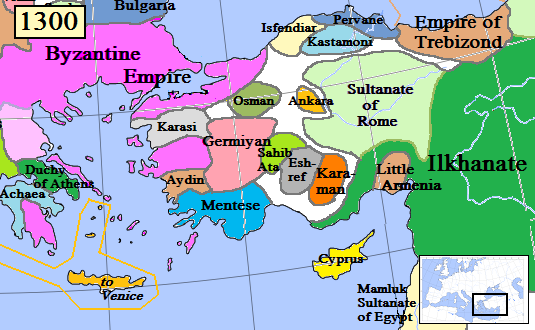Marc
Donor
A not too speculative riff...
Some convergence that offsets divergence:
In 1302 Andronikos II is a simple monk buried in some monastery, his son and co-emperor Michael is either with him, or blinded. So...
Roger de Flor collects, with strong encouragement from Alfonso Frederick of Aragon, King of Sicily, thousand of mercenaries, forms the Catalan Company, and since he isn't hired by the Byzantines decides to conquer the principality of Achaia, which upsets a number, mostly French, that he, his men, and his theoretical sovereign, aren't unhappy to upset.
He is successful, not in small part due to his being careful to give allegiance to his king. Success breed success, over the next fifteen years he ends taking over the Duchy of Athens, and the Byzantine holding of Morea. Uniting all of southern Greece.
Ruggero Flores dies in 1320, in bed, Duke of Grecia...

(The mild convergence here is that the Catalan Company did end up conquering the Duchy of Athens in 1311, and some years later a good chunk of Thessaly, the Duchy of Neopatria).
Plausible and reasonable - at least I think so right now. It shouldn't have a major effect on the Byzantine Empire for some time, it might swerve some Italian history though... thoughts?
Some convergence that offsets divergence:
In 1302 Andronikos II is a simple monk buried in some monastery, his son and co-emperor Michael is either with him, or blinded. So...
Roger de Flor collects, with strong encouragement from Alfonso Frederick of Aragon, King of Sicily, thousand of mercenaries, forms the Catalan Company, and since he isn't hired by the Byzantines decides to conquer the principality of Achaia, which upsets a number, mostly French, that he, his men, and his theoretical sovereign, aren't unhappy to upset.
He is successful, not in small part due to his being careful to give allegiance to his king. Success breed success, over the next fifteen years he ends taking over the Duchy of Athens, and the Byzantine holding of Morea. Uniting all of southern Greece.
Ruggero Flores dies in 1320, in bed, Duke of Grecia...
(The mild convergence here is that the Catalan Company did end up conquering the Duchy of Athens in 1311, and some years later a good chunk of Thessaly, the Duchy of Neopatria).
Plausible and reasonable - at least I think so right now. It shouldn't have a major effect on the Byzantine Empire for some time, it might swerve some Italian history though... thoughts?


